Kruder Siblings conquer iconic Verzasca Dam
second edition, attracted 24 of the world's best…
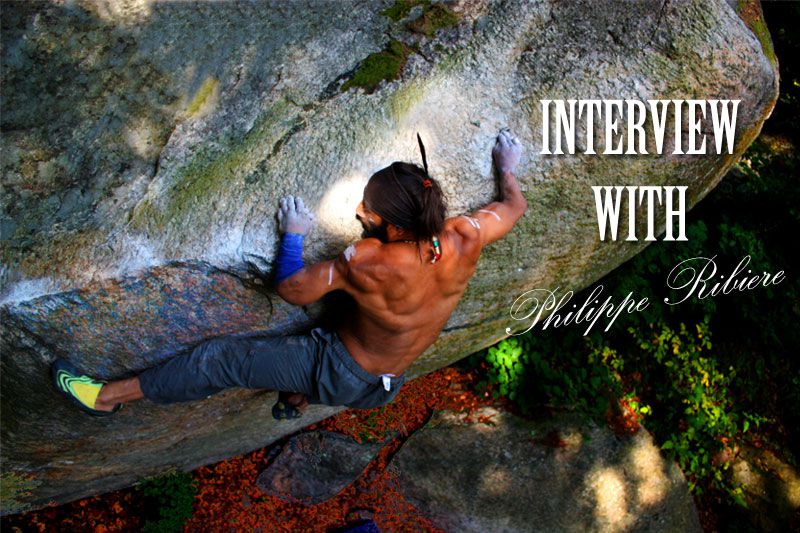
A: After couple of years of preparation, filming, editing, the documentary Wild One, a story of Philippe Ribiere that mainly focuses on finding your natural mother is finished. How do you feel?
P: It's a long story. I was traveling Europe. During one year, I did some lectures in climbing gyms, handicap institutions and also for the French Embassy. At the same time, my other goal was to share my passion with the best climbers. I visited a lot of boulder locations and I must admit that it has been my best experience ever to learn who I am and first to know how the handicap topic was considered in Europe. When I went to Slovenia, I met Natalija Gros, who had just become the European Champion in bouldering. She introduced me to a filmmaker, who made the “Chalk and Chocolate” film about her performances. During a diner with also Martina Cufar, I met Jure Breceljnik (editor's note: director of the Wild One), who fall right away in love with me and was interested to make a movie about me.
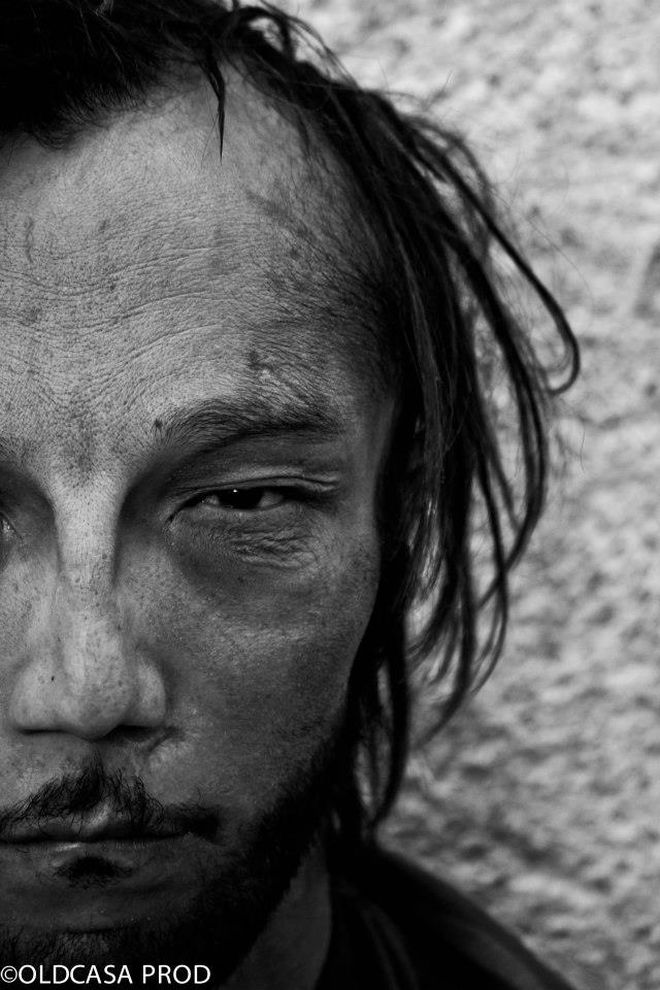
At first, I didn't believe it because it was not for the first time I got such a request - and no one kept promises. After my journey, Jure came to my place in France without telling me or calling me so. He came, put the money on the table and said, “ I got the money from the RTV Slovenia (editor's note: RTV is Radio-Television of Slovenia). Do you believe me now?" I accepted and the next summer 2010 we made the first trailer in Croatia. During the same year we traveled just two of us and we made it. In between the end of filming and editing we had the honor to be selected for MIPDOC in Cannes (the international showcase for documentary screenings; editor's note). After a hard pre-selection with around 5.000 movies in the same bag we finished 6th. It meant that we went through and Jure had the opportunity to give a speech in front of all the best filmmakers. During 2011, we welcomed on board Svetlana Damic, who edited the film. Later on I found out that she was the cousin of Emir Kusturica:) After the movie had been finished we had a lot of screening shows around the world before we sold rights to several TVs around the world. We also expected French TV to showcase it but it didn't work out in the end. We were really disappointed about it. Maybe the reality is that it was not so much “big-brothers-documentary" oriented, with all the drama and cries. Like the old saying goes, “No one is a messenger in his own country”. But it's gone and I am back to my old life now.

A: Are you satisfied with how it turned out?
P: I am a perfectionist and it's hard to answer this question. Firstly, I wasn't really interested to show my private life and secondly, I wasn't interested in looking after my biological mother because it was never the "big" goal in my life - even though I should have to do it once. The movie's topic is really sensitive to talk about - the handicap, abandonment, missing love, etc. But yeah, I am satisfy with how it turned out in the end. It made me stronger. Plus who can say he has a movie about his life?
"Maybe some people got to know me afterwards but once again, it's not my goal to be popular. My goal is to give back the gift that the climbing world gave me, considering me - not ignoring me"
A: Do you think people recognize you now more?
P: No, I don't think so and it is not important in my life. But I think, it's important to tell the public that I was born with nothing and built my life as I heard it. I wanted to raise my handicap problems and it is true that medias, sponsors, climbers and the public helped me to get more confidence. I started climbing in 1994 and obviously, I didn't meet any disabled climbers outside. To make all the evolution of my personality, I went deep in the handicap subjects. This is also why I created the HANDI-GRIMPE climbing event for handicapped and "normal" climbers for which I chose to add artificial handicaps like blinds, attached legs and attached arms instead. It became famous in France but it was more about promoting the paraclimbing in the world. Now it's been around for 12 years. A lot of people didn't believe in my project really but in 2011, we had the first Paraclimbing World Championships where I got my first medal. Maybe some people got to know me afterwards but once again, it's not my goal to be popular. My goal is to give back the gift that the climbing world gave me, considering me not ignoring me. It wasn't easy every day, especially in the normal life, but I am proud to be part of the evolution in the climbing competition. Now we have regular competitions and disabled climbers are proud to show up and to compete.
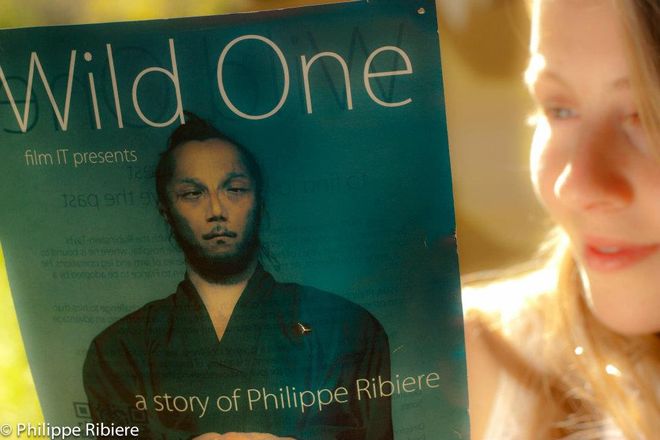
A: A blu-ray copy of the film along with the rights to host a private screening of the film is purchasable through FilmIt. You are also available for motivational speeches alongside the screening. Is that right?
P: Yes, that's right.
A: You are doing it for some reason obviously, the Rubinstein-Taybi syndrome. But do you also want people to know who Philippe Ribiere the climber is or who Philippe the man is?
P: It can turn to an egoistic trip (laughing). When I started promoting paraclimbing, I read an article about one disabled climber from France, who was disappointed by empty promises. I said to myself, “OK Philippe, you'll have to do something because the climbing community helped you". I feel I have to give back. It has become my mission now to give back to people whether they are disabled or not. We have only one life and anything can happen to anybody anytime. I was right and after the movie, I have become the example now.
A: That's a definitely good approach so I guess it's how we will be seeing you in the future, giving speeches, motivating people.
P: I wish to.
A: You travelled quite a lot during the filming. What location did you liked the best?
P: One of my dreams was always going to Japan. The American trip was also funny because I met my good friend, Jason Khel and also a personality rather unknown in Europe, Ronnie Dickson (editor's note: Ronnie lost his leg above the knee because of a congenital disorder). It was also cool because I wished once to go to Hueco Tanks after seeing many pictures of this amazing place. The one I always have in my mind is Fred Nicole in “Martini Rood”.
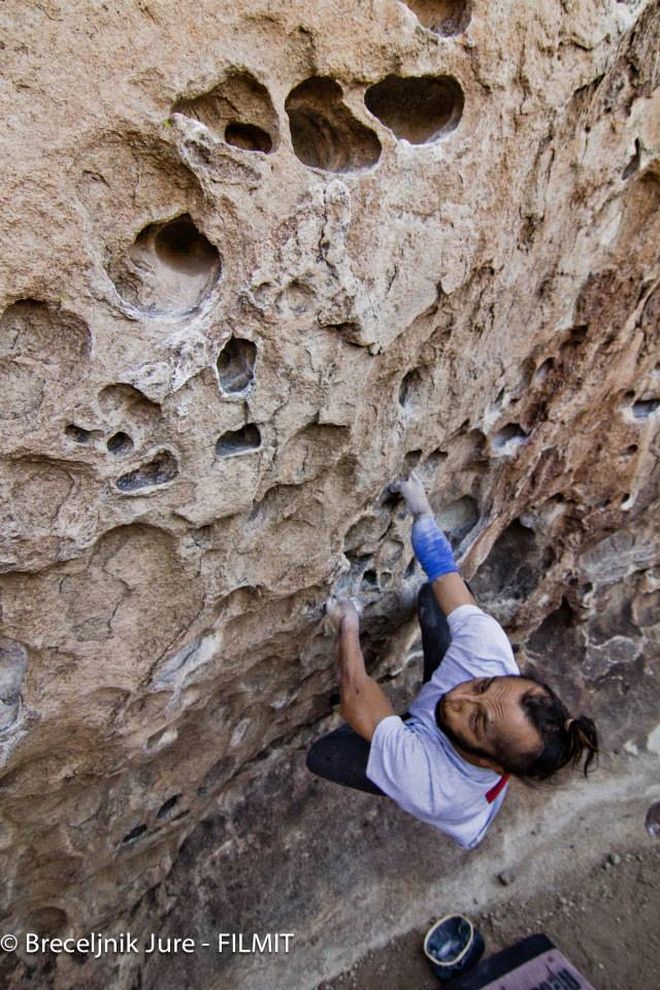
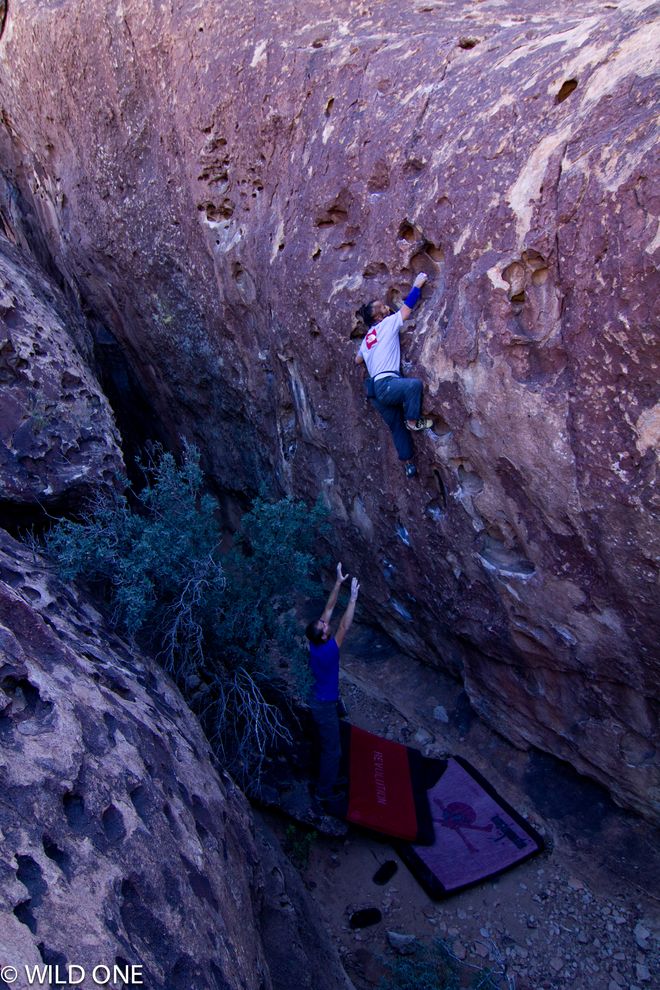
A: I actually liked that one particular moment in the movie when you climbed with a blind climber in Japan. What was his name?
P: Koichiro Kobayashi. This guy really impressed me because he climbed the same route like me without falling and also because he is blind. And also because he led the first unofficial competition in Japan that served the IFSC to see what the next World Championships in 2011 could be like.
A: You were there on occasion of the first international official paraclimbing competition in Tokyo. You finished 3rd in speed. It was your first international competition, wasn't it?
P: Yes, it was.
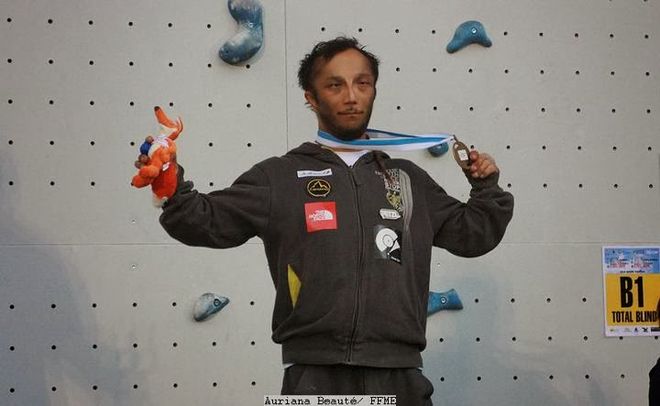
A: But competing isn't really your thing, is it?
P: That's right, I don't like to compete because it makes me nervous. Also, it is strange for me because I could not compare myself with anyone - in sport, in a social life. Somehow, my handicap was my weakness but now it is my power and my costume to see what the nature already gave me. Why should I ask for something better than I already have, even if it's abnormal. What is the normality and why we want to be better than a word that nobody can give a right definition to, even if it exists? On the other hand, I was really proud to compete. You have to prepare, train and that's what I like about it because it makes my climbing better. But I will not compete this (2015) year.
A: Why is that?
P: Because rules are not fixed properly for me. I am not able to compete in a category in which my disability would fit in. I don't have flexible wrists and I have short arms so as you can imagine, some holds are difficult to grab. To understand it more, there is an insufficient amount of climbers with the same disability like me, not enough to open a new category for. But through my trainings, I've been working on extending my body flexibility to be able to do moves I wasn't able to do 3 years ago. And that's a big deal for me.
"I don't want to change my handicap at all"
A: I'll just get to the beginning of what you've said. They don't have a category for you to compete in, is that what you are saying?
P: There is but with too many differences between all handicaps. For instance, it is the same like if I would compete against you. And that's not fair.
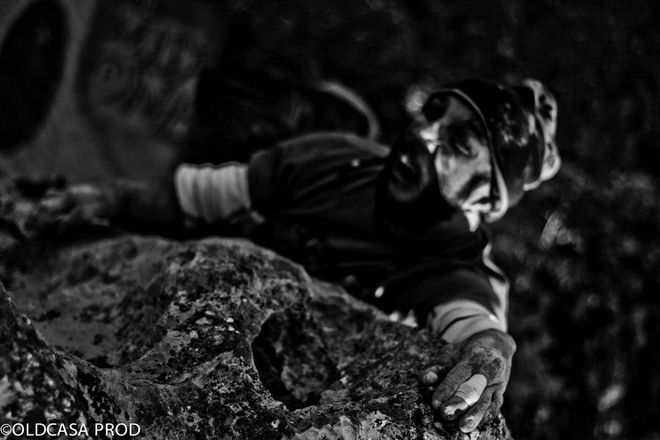
A: It's quite difficult to decide what category a disabled climber should be throw in because everybody is different. Do you think that people who make those decisions don't do their job properly?
P: No,no,no. It's hard but they need to fix some problems like the medical check to separate categories. But again, until there are not enough disabled climbers the problem will stay on. After I gave some rational thoughts to why I am competing, I now don’t see the goal. It is true that my ego got a slap and it is also good because to become a champion, I have to be a bit egocentric but not too much. When the category rules change to my advantage I will come back. Honesty I have so much more pleasure to progress outside that at the end, I will rather train to accomplish my goal like to climb a 7B boulder.
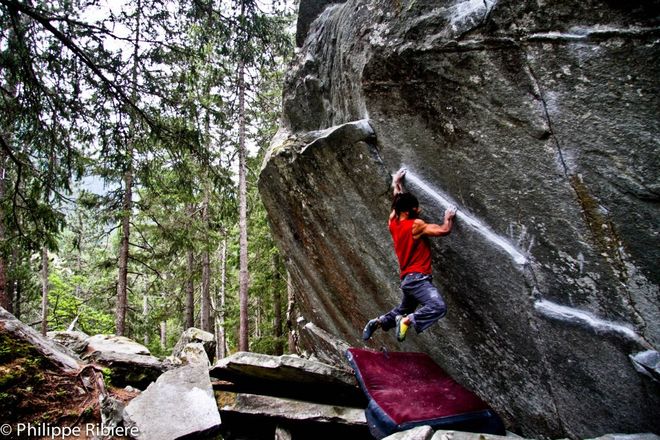
A: Hopefully, the rules will get fixed soon. Let's talk about something else. I've read on your blog that someone smashed your van last summer.
P: It happened last July in France. It wasn't my fault. The driver who hit me was on the phone while driving. But I a have a new car now so it's all good. Thankfully, climbers that follow me on Facebook, on my blog sent me some donations. I could not expect more and I will never find a word to thank them.
A: From that moment on, you practically became homeless as you'd been living in the car.
P: Firstly, it is my way of life after the Evolution Tour in 2009. I chose to live outside to feel more liberty. After 6 years, I realized that it was not just a way of life but it is also for an economic reason. When you are disabled person you get a pension from the Etat. Per month I live with 750 Euros and if you count all charges (rent, electricity, water, car expenses, food, etc.) you will see that I have nothing at the end of the month. Well it is what it is. Also the reality is that you can't get a credit from the bank, which means I can't buy any house.
A: I didn't know that. That's rather unusual.
P: Yeah, it is. But it's one of those things that make me to push even more, to survive.
A: That only confirms what you have once said, that you don't need a 'home' to be happy.
P: I've been living outside for 6 years. It keeps you active. If it rains, you have to do something. Harder the challenge is, more you evolve within the lifetime. Of course I love the comfort but it is not the same game as people struggling in some parts of the world. After being on some trips in India, China or some other part of the world, there are people surviving every day, every minute, every second. And there are people who have got nice cars, homes and I don't know what else and yet they complain. I can't rent a flat but I can pay for other things to enjoy in life. I can be a homeless with some money (laughing)
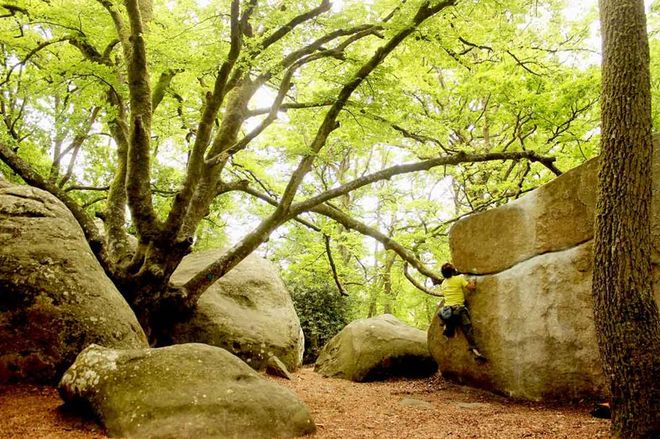
A: Money doesn't make people happy. Everybody struggles at some point of his life but I guess it's a good thing.
P: Exactly. But I think that also because I am single (laughing).
A: Is there a girl in Philippe's life?
P: I will not answer this question. Maybe or not? What do you think?
A: Would you like to get married at some point?
P: When I see many couples divorce, couples who have just life problems with misunderstanding I will say “NO”. Also because I don’t see the point to be married. Is it a social position to exist in life? OK! Honestly, I love women so much that to have only one is a bit of a torture. Even though I love my wife or my girlfriend, she is not my property, an object. And I feel that in this world, we love to keep all things like a trophy or an object.
"One climber came to me and said the way I climbed looked awesome. From that moment on I realized I have to think about people the way they think about me"
A: I understand what you are saying. Do you think this might have anything to do with your childhood? Like you saw things around you but couldn't understand at that point, things that made sense later in life?
P: Hmm. It's the same like with trying to find my biological mother that I didn't have any expectations for. I had no friends when I was a kid but I can't blame anybody. Maybe I didn't give them the opportunity to understand me and it is maybe the same with love. One day I understood that if I don’t open my heart I could not reach humanity. I was too shy of my handicap but it changed when I entered the climbing community. One climber came to me and said the way I climbed looked awesome. From that moment on I realized I have to think about people the way they think about me.
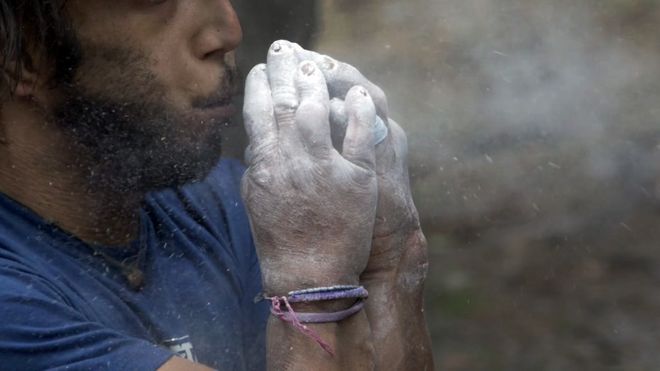
A: It's a great example of how climbing help you to understand who you are and where you are going. Last question. After another chapter in life is done, have you thought of making a sequel to Wild One?
P: It is a really nice question and I am surprised that it wasn't your principal one. I got enough with the handicap. I turned the page with Wild One documentary and it already showed a lot. Now, I would like to make another one, more "sport" oriented. For example, I don't have any strength. I would like people to see that I can’t take some holds like undercleans, side-pool,etc. Some filmmakers are interested but we will see how things goes.
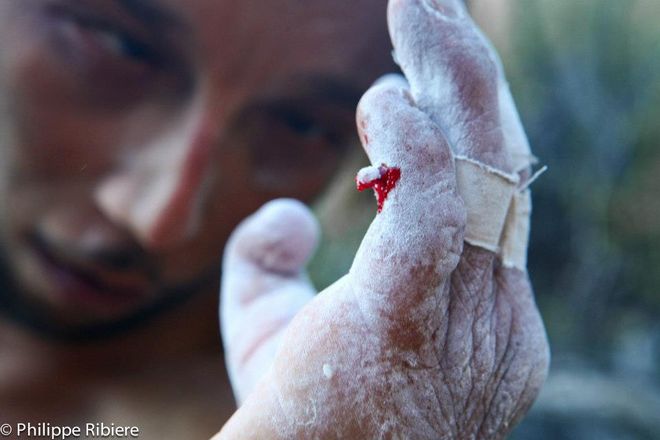
A: It'd be great to see a movie about you that is more climbing oriented. There are certainly things that people don't know about you as far as the climbing alone is concerned. I understand that people wants to know all the drama but I'd rather see you in a movie like that, a climbing movie.
P: If somebody is interested, let's do it!
A: It'd be cool to have another interview with you when that time comes.
P: Yeah:)
-END-
Source: http://www.adrex.com